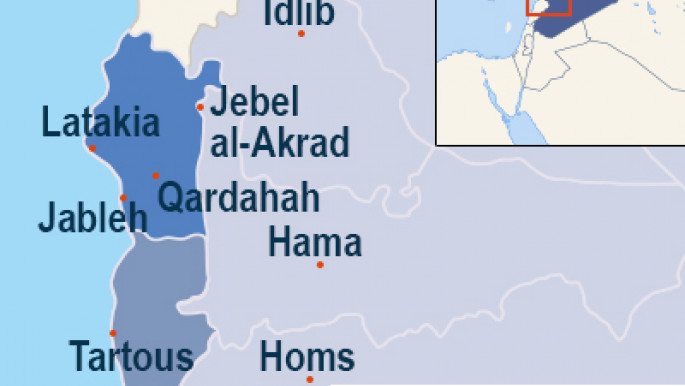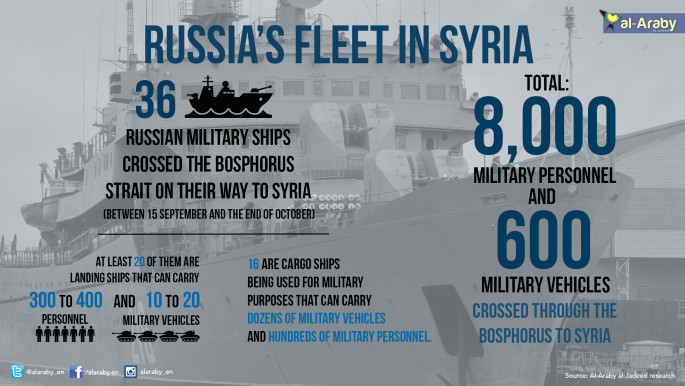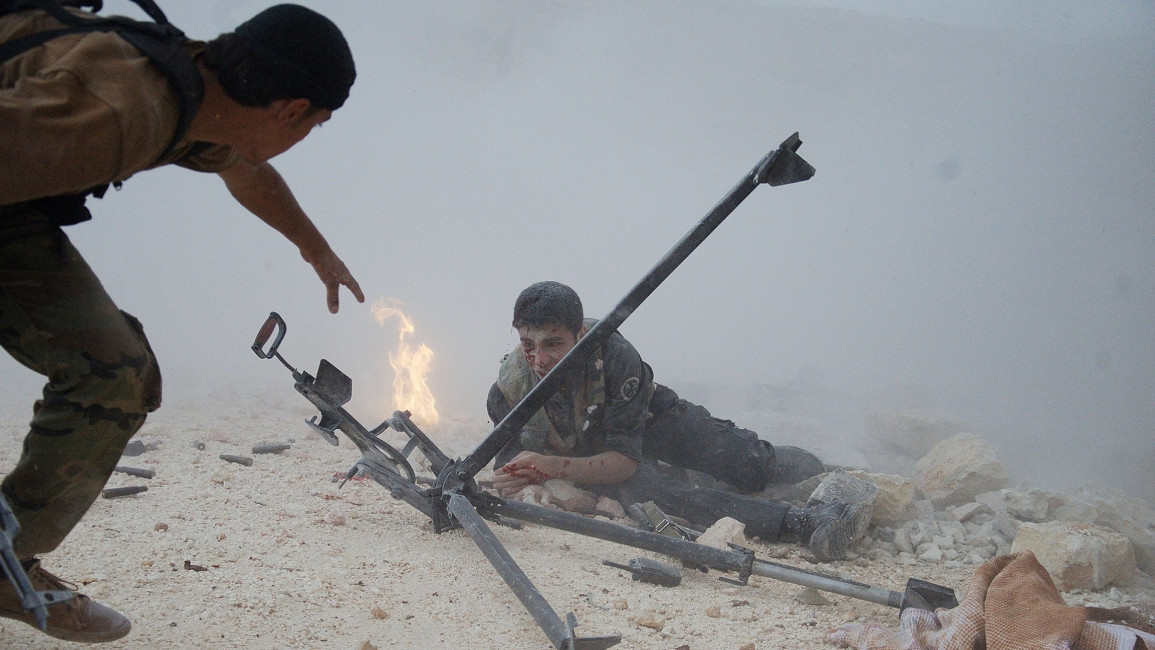The Kremlin explains
Kremlin spokesman Dmitry Peskov told reporters later on Friday that Putin had been talking about weapons supplies to the armed forces loyal to Assad.
Free Syrian Army rebuts Putin's claims about joint cooperation
President Vladimir Putin had claimed Russia is supporting the opposition Free Syrian Army, providing it with air cover, arms and ammunition in joint operations with Syrian troops against Islamist militants.
His statement appeared to be the first time Moscow said it was actually supporting Syrian President Bashar al-Assad's opponents in the fight against Daesh (IS) forces. Putin said last month the Russian air force had hit several "terrorist" targets identified by the Free Syrian Army.
"By supporting the FSA he probably means bombing the FSA," said Mamoun Suweid, FSA Central Division deputy commander in northern Hama.
 |
|
Suweid told al-Araby al-Jadeed Putin's statements were meant to "mislead international public opinion," pointing out that Russian airstrikes have repeatedly targeted FSA positions since Moscow's intervention in Syria began on Sep. 30.
The FSA does not need Russia's help and would not deal with its "enemy", said FSA founder Col. Riad al-Asaad.
Asaad told al-Araby al-Jadeed Putin's statements were "odd", when Russia continues to bomb the FSA and Syrian civilians across Syria, as he said.
Asaad reckoned Putin was probably talking about the Kurdish People's Protection Units (YPG), which he accused of being loyal to the regime.
Recently, the YPG and Kurdish-dominated Syrian Democratic Forces (SDF) engaged in fighting with FSA-aligned rebel groups near Azaz in northern Aleppo, allegedly under Russian air cover.
But Peskov did not say Putin had been mistaken or misquoted about supplies to the FSA and did not deny weapons were going to the opposition force.
"The work of our aviation group assists in uniting the efforts of government troops and the Free Syrian Army," Putin told an annual meeting at the Defence Ministry.
|
||
"Now several of its units numbering over 5,000 troops are engaged in offensive actions against terrorists, alongside regular forces, in the provinces of Homs, Hama, Aleppo and Raqqa," he said, referring to the Free Syrian Army.
"We support it from the air, as well as the Syrian army, we assist them with weapons, ammunition and provide material support."
When asked if Putin had been speaking about the Free Syrian Army, Peskov replied: "Please do not cling to meanings in this case. Such an interpretation is possible."
"Russia supplies weapons to the legitimate authorities of the Syrian Arab Republic," he said.
If confirmed, Russian support for the FSA would represent a major policy shift for Moscow, which has been accused by the West of striking moderate rebels to back up Assad instead of its declared goal, Daesh.
|
||
Russia's Defence Minister Sergei Shoigu said Russian warplanes have flown 4,000 combat sorties in Syria since Moscow launched its air campaign on Sept. 30, destroying 8,000 "terrorist" targets.
He added that Russia moved 214,000 metric tons of supplies to support the military action in Syria and helped restore a tank repair factory in the Syrian province of Homs.
US State Department spokesman John Kirby said it was unable to confirm claims by Putin that his country supports the FSA as well as Syrian government forces, providing it with arms and air support.
"It's unclear to us ... whether these claims of support to the FSA are true," Kirby said. "So I'm not in a position to validate the comments except to say that as we've said in the past, the vast majority of airstrikes conducted by Russian military aircraft" are against groups opposed to Assad and not aimed at Daesh, he said.
Talking to his generals, Putin also issued a veiled warning to Turkey, whose downing of a Russian bomber jet near the Syrian-Turkish border last month sent bilateral relations to a freezing point and led Moscow to impose economic sanctions to Istanbul.
"I want to warn those who may again try to stage provocations against our troops," he said.
"I order you to act in an extremely tough way. Any targets threatening Russia's [military] group or our land infrastructure must be immediately destroyed," Putin told the generals.
Turkish Foreign Minister Mevlut Cavusoglu called on Russia for calm on Friday, but said Turkey's patience is not unlimited.
 |
| [Click to enlarge] Read more:Russia's war for Assad: Military assistance in numbers |
IS carries out suicide bombings
Meanwhile, IS claimed a triple truck bomb attack that killed dozens of people in a part of northeastern Syria where Kurdish YPG forces have been pushing back the Islamist militants in recent weeks.
The three blasts, carried out by at least two suicide bombers, went off outside a hospital, at a market and in a residential area in the town of Tel Tamer on Thursday night, the YPG's Redur Xelil said via an Internet messaging service.
He put the toll to at least 50 dead and 80 wounded. The Asayish, a Kurdish internal security force, put the death toll at 26.
|
||
On Saturday, twin bomb blasts in a government-controlled neighbourhood of Syria's Homs city killed at least eight people and wounded dozens, state media and a group monitoring the war said.
One of the bombs detonated close to a hospital in the mainly Alawite neighbourhood of al-Zahra in the east of Homs city, the Syrian Observatory for Human Rights monitoring group said, adding that the death toll was likely to rise.
Syrian state television described the attack as "two large terrorist explosions". News agency SANA published a photo of two men carrying a woman away from burning wreckage.
Homs was a center of the uprising against President Bashar al-Assad that started in 2011. The blasts come days after the implementation of a truce deal in Waer, another district of Homs situated on its northwestern outskirts.
Russia criticises opposition conference
A meeting of Syrian opposition groups in Riyadh Thursday did not represent all opposition groups from the country, the Russian Foreign Ministry said on Saturday.
|
||
"We cannot accept the attempt by the group which met in Riyadh to assign itself the right to speak on behalf of the entire Syrian opposition," the ministry said in a statement.
The talks between Syrian opposition groups in Saudi Arabia this week called for an all-inclusive, democratic Syria and said Moscow's regional ally President Bashar al-Assad should leave power at the start of a transitional period.
Agencies contributed to this report

![Members of the Algerian delegation threw roses into the Seine [Getty]](/sites/default/files/styles/image_330x185/public/2024-07/GettyImages-2162980872.jpg?h=199d8c1f&itok=h_3o_TOL)

![The Libyans were arrested at a farm in Mpumalanga province east of Johannesburg [Getty]](/sites/default/files/styles/image_330x185/public/2024-07/GettyImages-2162903568.jpg?h=199d8c1f&itok=4Qzg79i1)